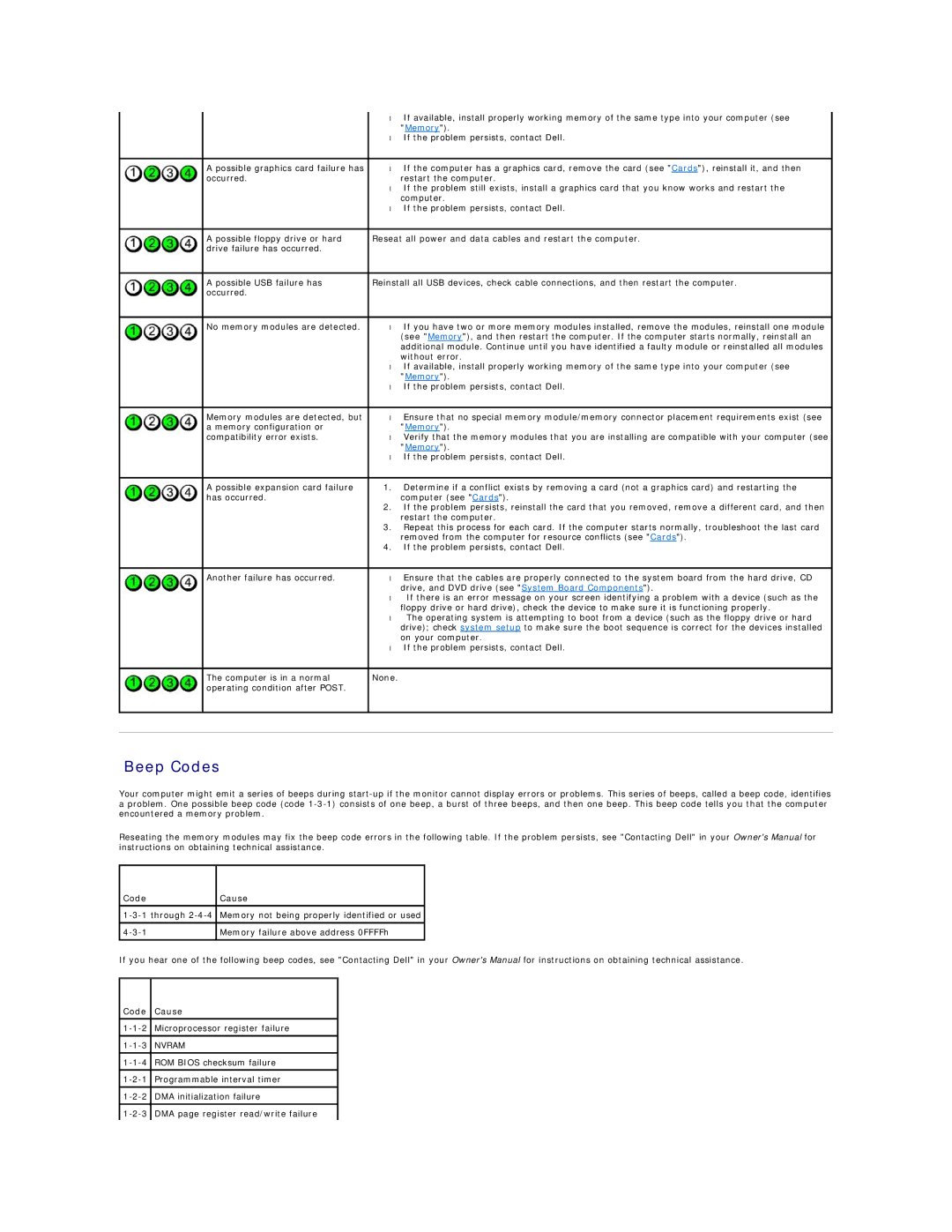
|
| • | If available, install properly working memory of the same type into your computer (see |
|
|
| "Memory"). |
|
| • | If the problem persists, contact Dell. |
|
|
|
|
| A possible graphics card failure has | • | If the computer has a graphics card, remove the card (see "Cards"), reinstall it, and then |
| occurred. |
| restart the computer. |
|
| • | If the problem still exists, install a graphics card that you know works and restart the |
|
|
| computer. |
|
| • | If the problem persists, contact Dell. |
|
|
| |
| A possible floppy drive or hard | Reseat all power and data cables and restart the computer. | |
| drive failure has occurred. |
|
|
|
|
| |
| A possible USB failure has | Reinstall all USB devices, check cable connections, and then restart the computer. | |
| occurred. |
|
|
|
|
|
|
| No memory modules are detected. | • | If you have two or more memory modules installed, remove the modules, reinstall one module |
|
|
| (see "Memory"), and then restart the computer. If the computer starts normally, reinstall an |
|
|
| additional module. Continue until you have identified a faulty module or reinstalled all modules |
|
|
| without error. |
|
| • | If available, install properly working memory of the same type into your computer (see |
|
|
| "Memory"). |
|
| • | If the problem persists, contact Dell. |
|
|
|
|
| Memory modules are detected, but | • | Ensure that no special memory module/memory connector placement requirements exist (see |
| a memory configuration or |
| "Memory"). |
| compatibility error exists. | • | Verify that the memory modules that you are installing are compatible with your computer (see |
|
|
| "Memory"). |
|
| • | If the problem persists, contact Dell. |
|
|
|
|
| A possible expansion card failure | 1. | Determine if a conflict exists by removing a card (not a graphics card) and restarting the |
| has occurred. |
| computer (see "Cards"). |
|
| 2. | If the problem persists, reinstall the card that you removed, remove a different card, and then |
|
|
| restart the computer. |
|
| 3. | Repeat this process for each card. If the computer starts normally, troubleshoot the last card |
|
|
| removed from the computer for resource conflicts (see "Cards"). |
|
| 4. | If the problem persists, contact Dell. |
|
|
|
|
| Another failure has occurred. | • | Ensure that the cables are properly connected to the system board from the hard drive, CD |
|
|
| drive, and DVD drive (see "System Board Components"). |
|
| • If there is an error message on your screen identifying a problem with a device (such as the | |
|
|
| floppy drive or hard drive), check the device to make sure it is functioning properly. |
|
| • The operating system is attempting to boot from a device (such as the floppy drive or hard | |
|
|
| drive); check system setup to make sure the boot sequence is correct for the devices installed |
|
|
| on your computer. |
|
| • If the problem persists, contact Dell. | |
|
|
|
|
| The computer is in a normal | None. |
|
| operating condition after POST. |
|
|
|
|
|
|
|
|
|
|
Beep Codes
Your computer might emit a series of beeps during
Reseating the memory modules may fix the beep code errors in the following table. If the problem persists, see "Contacting Dell" in your Owner's Manual for instructions on obtaining technical assistance.
Code | Cause |
|
|
Memory not being properly identified or used | |
|
|
Memory failure above address 0FFFFh | |
|
|
If you hear one of the following beep codes, see "Contacting Dell" in your Owner's Manual for instructions on obtaining technical assistance.
Code | Cause |
|
|
Microprocessor register failure | |
|
|
NVRAM | |
|
|
ROM BIOS checksum failure | |
|
|
Programmable interval timer | |
|
|
DMA initialization failure | |
|
|
DMA page register read/write failure |
